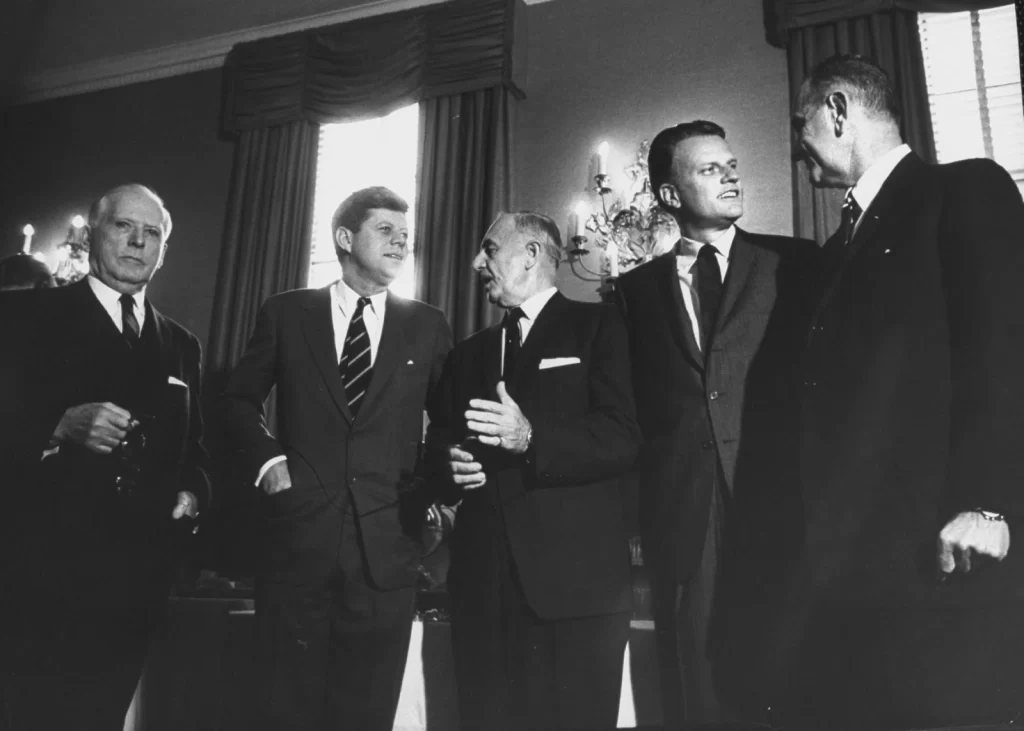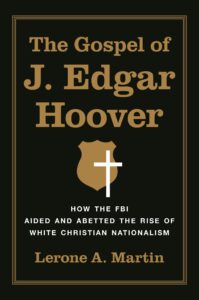Suing the FBI and Uncovering a History of White Christian Nationalism
An excerpt from The Gospel of J. Edgar Hoover: How the FBI Aided and Abetted the Rise of White Christian Nationalism

(Rev. Billy Graham with President Kennedy. Image source: LIFE Picture Gallery.)
The following excerpt comes from Lerone A. Martin’s book The Gospel of J. Edgar Hoover: How the FBI Aided and Abetted the Rise of White Christian Nationalism, reprinted here with permission from Princeton University Press copyright © 2023. The book explores J. Edgar Hoover’s role in using the FBI to promote and support white Christian nationalism.
The excerpt is from the book’s prologue, “Suing the FBI.”
***
 I sued the FBI to write this book. On August 12, 2018, I filed suit against the US Department of Justice (DOJ) for FBI records on Billy Graham (Martin v. United States Department of Justice, 2018, Case Number 18-1885). I was convinced the preacher had an FBI file. No American in the mid-twentieth century could reach his level of fame, notoriety, and influence, yet manage to escape the vigilant, prying eyes of Hoover’s FBI. And no civilian was permitted into Hoover’s inner sanctum for a staged photograph without knowingly or unknowingly enduring a thorough background check. In one way or another, Graham was involved with the FBI, and I thought the Freedom of Information Act (FOIA) was the key to find out how. But I was wrong. The FBI played hardball, so I sued. It was my only recourse, a desperate attempt to force the FBI to abide by the FOIA.
I sued the FBI to write this book. On August 12, 2018, I filed suit against the US Department of Justice (DOJ) for FBI records on Billy Graham (Martin v. United States Department of Justice, 2018, Case Number 18-1885). I was convinced the preacher had an FBI file. No American in the mid-twentieth century could reach his level of fame, notoriety, and influence, yet manage to escape the vigilant, prying eyes of Hoover’s FBI. And no civilian was permitted into Hoover’s inner sanctum for a staged photograph without knowingly or unknowingly enduring a thorough background check. In one way or another, Graham was involved with the FBI, and I thought the Freedom of Information Act (FOIA) was the key to find out how. But I was wrong. The FBI played hardball, so I sued. It was my only recourse, a desperate attempt to force the FBI to abide by the FOIA.
Revelation is the purpose of the modern FOIA. President Lyndon Johnson signed it into law on Independence Day, 1966. LBJ publicly praised the bill, which gave Americans the opportunity to petition for records of US executive branch agencies. “This legislation springs from one of our most essential principles: a democracy works best when the people have all the information that the security of the Nation permits,” he proudly announced. Privately, however, the president despised the bill, allowing it to languish on his desk. Johnson finally signed “the fucking thing,” as he scornfully referred to it, after much persuasion, narrowly ducking its pocket veto. His reluctant attitude foreshadowed how executive branch agencies would execute the law.
My ordeal with Graham gave me firsthand experience with their approach. I made my original FOIA request on February 21, 2018. It was the day Graham died, and his legal privacy rights, at least in textual materials, went to the grave with him. The FBI acknowledged my FOIA request, yet failed to make a determination within the twenty-day statutory deadline mandated by Congress. The FBI did not bother to claim “unusual” or “exceptional” circumstances to excuse their malfeasance. They just ignored me. I heard from the Bureau almost two months later. The April letter was as bold as the typeface in which it was set. The Bureau did not concede breaking the law. They simply informed me they would not disclose or even acknowledge the existence of any records concerning Billy Graham and his relationship to law enforcement or national security. These were significant and ironic exclusions for Graham. The preacher had advised US presidents for more than half a century, advocating evangelical Christianity as the key to national security, yet there would be no disclosures. If the FBI determined there were files that resided outside of this broad purview, they pledged to make them public via their FOIA website at some undisclosed date in the future. Then, and only then, would I be informed. The Trump DOJ dug in their heels. This should not have been surprising. President Donald Trump’s attorney general, William Barr, was constantly lambasting the FOIA as a dangerous nuisance, that amounted to “constant harassment” of the DOJ. I decided to join the torrent of disturbance, filing suit in the US District Court for the District of Columbia.
The civil litigation produced a saga of hide and seek, lost and found. The FBI admitted a number of records on Graham had been destroyed in accordance with a 1986 court order. The ruling created the FBI Records Retention Plan, a rubric that assigns preservation schedules for FBI files based on their potential research value. More than three decades later, the same court informed me that records pertaining to the nation’s most famous evangelist had been legally destroyed by the FBI. What was valuable to me was deemed legally disposable by the FBI. Worse, the FBI testified that other files had been lost or were “unable to be located.” Judge Christopher R. Cooper, an Obama appointee, supervised the FBI as it located and turned over files on a rolling basis. The FBI produced a deluge of documents detailing investigations of deranged death threats targeting Graham, as well as an obsessive amount of newspaper clippings covering the preacher’s whereabouts and statements. However, there was nothing detailing Graham’s relationship to Hoover, the FBI, or any other executive agency.

(Rev. Billy Graham preaching in Berlin. Image source: Associated Press.)
The promised transparency of President Biden’s administration provided false hope. In July 2021, Kathleene Molen, Assistant United States Attorney (AUSA) for the US Attorney’s Office for the District of Columbia, brought good tidings. AUSA Molen informed my counsel, Tuan Samahon, “the FBI has located a file that it had previously been unable to locate. The FBI indicates that the file is related to Billy Graham.” With no explanation, the FBI miraculously “found” a thirty-page file on Billy Graham. I did not care if it was the result of an actual miracle, political timing, or just the correction of incompetence: I counted it a godsend. But my joy was short-lived. The once lost, now found file was largely more of what I had already received.
But I refused to stop. The case was settled, with the DOJ agreeing to pay “for attorney fees and other litigation costs.” Upon turning my attention to Graham’s official archives, I quickly learned the FBI had a co-conspirator in its archival cover-up. Shortly after my public lawsuit, Billy Graham’s son Franklin Graham, a staunch right-wing evangelist, announced Billy Graham’s archival holdings would be moved from their original longtime home of Wheaton College to North Carolina. This may not have been a coincidence. The FBI has a practice of releasing “High Visibility Memoranda,” warning various government and civic entities of a proposed release of high-profile files and the possible fallout. The Bureau denied the existence of such a memo in my case. However, the result was the same. Billy Graham’s family took cover, protecting Billy Graham’s legacy as the figurehead and proxy of modern white evangelicalism at all costs. Now Graham’s archival holdings, dating back to 1940, are under the complete control and supervision of the Graham family, specifically Franklin Graham, and cannot be accessed without his blessing.
The younger Graham is the latest in a long line of white evangelicals vying to protect and police the legacy of modern white evangelicalism and its complicated relationship with white Christian nationalism. Pioneering white evangelical institutions such as Christianity Today, the National Association of Evangelicals, and the National Religious Broadcasters have scrubbed detailed references to J. Edgar Hoover and the FBI from their respective archives. The deafening silence led me to seek FBI files on the white evangelical world that surrounded Billy Graham—the clergy, churches, magazines, and organizations the evangelist helped to establish—the foundational entities of modern white evangelicalism.
My labor was not in vain. The pages that follow draw upon thousands of newly declassified and released FBI files. The revelations therein are enhanced by my interviews with FBI special agents who worked for Hoover. Together, they show that J. Edgar Hoover and his FBI were central to postwar religion and politics. Hoover’s FBI joined forces with the founding architects of white evangelicalism to aid and abet the rise of white Christian nationalism as a legitimate force in American politics. The Gospel of J. Edgar Hoover moves this partnership out of the shadows and into the light.
This discovery illuminates the past, helping to explain twenty-first century US religion and politics. Following a string of white Christian nationalist violence, most notably the January 6, 2021, attack on the nation’s Capitol, the FBI announced renewed efforts to squarely deal with the domestic security threat of white Christian nationalism. The Bureau’s mission will be hampered if it does not trace the multiple origins, dwelling places, and institutional expressions of the threat—even if that trail leads all the way back to FBI headquarters and field offices. Likewise, many prominent white evangelicals have stated a desire to better understand when and how white nationalism came to possess a large portion of the movement. They believe this quest will help exorcise the demons. This book calls them to reconsider the very foundations of modern white evangelicalism, to reckon with the fact that the groundwork was laid, in part, by J. Edgar Hoover and his FBI.
Lerone A. Martin is the Martin Luther King, Jr. Centennial Professor and Director of the Martin Luther King, Jr. Research and Education Institute at Stanford University.
***
Interested in more on this topic? Check out episode 32 of the Revealer podcast with Lerone Martin: “The FBI and White Christian Nationalism.”